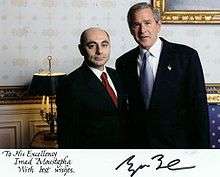Imad Moustapha
Imad Moustapha (Arabic: عماد مصطفى; born 11 March 1952) is the Syrian Ambassador to China and his country's former Ambassador to the United States.
Imad Moustapha عماد مصطفى | |
|---|---|
 Dr. Imad Moustapha (left) and U.S. President George W. Bush | |
| 9th Ambassador of Syria to the United States | |
| In office 2004 – December 2011[1] | |
| Preceded by | Rustum Al-Zubi |
| Personal details | |
| Born | 11 March 1952 Aleppo, Syria |
| Nationality | Syrian |
| Spouse(s) | Rafif |
| Children | Sidra, Saree |
| Residence | Washington, DC |
| Profession | Civil Servant |
| Website | http://imad_moustapha.blogs.com/ |
Biography
Imad Moustapha was born in Aleppo on 11 March 1952.[2]
He was Dean of the Faculty of Information Technology (IT) at the University of Damascus, and Secretary General of the Arab School on Science and Technology. He is a co-founder of the Network of Syrian Scientists, Technologists and Innovators Abroad (NOSSTIA). This organization was involved in establishing Meedan, "a non-profit social technology company which aims to increase cross-language interaction on the web, with particular emphasis on translation and aggregation services in Arabic and English."[3]
Media
Imad Moustapha regularly writes in the print media and appears on television, representing the Syrian government position. He has also occasionally appeared at public lectures, think-tanks, and world-affairs councils.[4]
Personal
His wide range of interests include: globalization, cultural identities, social and economic impacts of the Internet, and Western classical music.
Allegations of espionage
On June 25, 2011, the Washington Bureau chief of a major Kuwait newspaper (Al Rai), reported in NOW Lebanon that Ambassador Mustapha is engaged in various espionage activities, as well as threats to Syrians living in the US.[5]
See also
- University of Damascus
- United Nations Development Program
- United Nations Educational, Scientific and Cultural Organization (UNESCO)
- United Nations Economic and Social Commission for Western Asia
References
- http://syria-news.com/readnews.php?sy_seq=141248
- "Imad Moustapha: Curriculum Vitae".
- Meedan
- http://www.dallasnews.com/sharedcontent/dws/dn/opinion/viewpoints/stories/DN-moustapha_20edi.ART.State.Edition1.4265669.html
- "Archived copy". Archived from the original on 2011-06-27. Retrieved 2011-06-25.CS1 maint: archived copy as title (link)
External links
- Imad Moustapha discusses The U.S., Syria and the New Old Middle East: Confrontation or Cooperation?
- The Washington Diplomat Newspaper - Ambassador Profile
- Murder in Abou Kamal
- (Other information in this article as of 26 August 2006 is from Imad Moustapha's personal blog - https://web.archive.org/web/20100105115626/http://imad_moustapha.blogs.com/ - Accessed 19 June 2006. And from Forward Magazine where he is a regular contributing writer.)